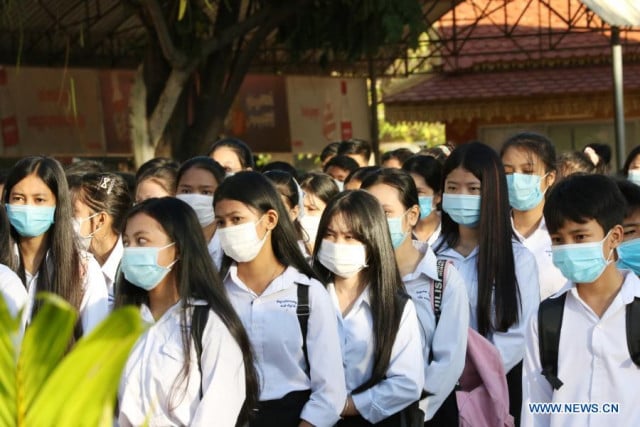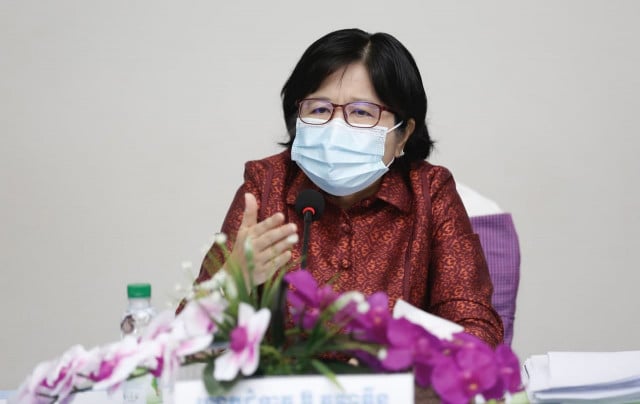The Need to Promote Mental Health Awareness among Cambodian University Students

- Phearun Chhoeurm
- May 1, 2021 11:33 AM
In recent decades, there has been a considerable increase in the number of students worldwide pursuing higher education. To adapt to the complex needs of the contemporary workplace, universities around the world are putting considerable effort into producing highly skilled graduates (Possa, 2006). With the rapid growth of job demands, university education has become very competitive, so students have to face more complex and challenging situations throughout their university years, putting some of them at risk of mental health issues.
Citing the National Institute of Mental Health of the United States, Pan (2017) noted that “mental health issues are a growing concern among college and university students worldwide, with depression, anxiety, and stress being the most common psychological issues”(p. 1). Nevertheless, this is not the new world’s phenomenon because there has been a massive rise in the number of university students who have experienced severe mental health problems since the 1990s (Kirsch et al., 2015). In Cambodia, this has become an emerging issue in recent years. The increasing number of Cambodian university students with psychological difficulties has been a growing concern compared to those in other countries (see Pan, 2017). Against this backdrop, this article will discuss the causes of mental health issues on university students globally and in Cambodia. This will be followed by some recommendations to promote mental health awareness in Cambodia.
Defining Mental Health Issues or Illnesses
Mental health issues or mental illnesses are defined differently based on different contexts. According to Cambridge Dictionary (n.d.), mental illness is “an illness that affects the mind.” The Department of Health in Australia (2007) defines mental illness as “a health problem that significantly affects how a person feels, thinks, behaves, and interacts with other people. It is diagnosed according to standardized criteria.” Similarly, American Psychiatric Association (2018) defines mental illnesses as “health conditions involving changes in emotion, thinking or behavior (or a combination of these).”
Common Mental Health Issues Facing University Students
Psychological issues such as depression, anxiety, and stress are common among undergraduate students worldwide (Mahmoud et al., 2012; Pan, 2017). Of the three common mental health issues, stress and anxiety are the most prevalent among college students (Gao et al., 2020; Kirsch et al., 2015; Pedrelli et al., 2015), while depression is the leading cause of disability, followed by suicide which affects people between 15-29 years of age more than other age groups (World Health Organization [WHO], n.d.). Other less common mentally related illnesses are mood disorder, eating disorder, sleeping disorder (insomnia), bipolar disorder, and schizophrenia.
- Stress, in general, refers to the emotional and physical tensions or reactions responding to the pressure of a situation or event. Stress, based on the academic perspective, “is the body’s response to academic-related demands that exceed adaptive capabilities of students” (Alsulami et al., 2018, p. 159). It has both positive and negative effects based on the number of environmental threats and challenges individuals face. A low level of stress can increase productivity; in contrast, a large amount of stress can lead to many problems such as anxiety, depression, high blood pressure, heart disease, heart attacks, stroke, and obesity.
- Anxiety is a state of worry or nervousness about a future situation or event associated with a negative feeling. According to Gale and Oakley-Browne (2000), anxiety disorder is excessive worry and tension which prolongs for more than five months, together with symptoms such as avoidance and muscle tension. Headaches, sleeping issues, and loneliness can also be considered symptoms of anxiety. An increased anxiety level can cause loss of motivation and self-esteem, depression, suicidal thoughts, and self-injury, among others.
- Depression is defined as “a mental illness in which a person is unhappy and anxious (worried and nervous) for long periods and cannot have a normal life during these periods” (Cambridge Dictionary, n.d.). It is referred to as “a common mental disorder that presents with depressed mood, loss of interest or pleasure, decreased energy, feelings of guilt or low self-worth, disturbed sleep or appetite, and poor concentration” (Marcus et al., 2012, p. 6). A high level of depression can lead to suicidal ideation or suicide and cause heart attack, stroke, cancer, diabetes, kidney disease, and so on.
Research on Mental Health Issues Facing Cambodian University Students
In recent years, mental health issues among Cambodian university students have emerged as a major problem. However, research investigating this phenomenon is still limited, making this issue less known to many (Pan, 2017).
Despite this, there are a few studies that have shed light on mental health issues in Cambodia. Pan’s (2017) study on 529 Cambodian university students, randomly selected from three public (56.4%) and private (43.6%) universities in Phnom Penh, showed that students used to experience stress (37.5%), anxiety (54.2%), and depression (44.6%). The psychological problems among Cambodian university students were higher than university students in some countries, such as Chile, China, Turkey, and Malaysia (Pan, 2017). While the causes of their depression, anxiety and stress were shared by other university students elsewhere, Cambodian university students mainly experienced challenges related to high expectations of academic achievement, financial responsibility, social life changes, exposure to diversity and new environments, and worries about life after graduation (Pan, 2017). Another study by Cornet (2017) revealed that mental health issues were growing among Cambodian university students. Specifically, the study found that 59.1% of 181 Cambodian first-year students at CamEd Business School experienced a high level of psychological distress.
A more extensive study with 1,359 university students, randomly selected from two public universities in Phnom Penh and Battambong, found that more than 50% of the participants were identified with depressive disorders (Ngin et al., 2018). The causes behind these issues included unhealthy eating habits, negative thoughts about body shape, general health status, and lack of physical activeness. Ngin et al. (2018, p. 1) added that “Depressive symptoms also remained significantly associated with adverse childhood experiences including physical violence, psychological abuse, and lack of general and medical care by family during childhood.”
Suggestions to Promote Mental Health Awareness among Cambodian University Students
To promote mental health awareness among university students, the Cambodian Ministry of Education, Youth, and Sport (MoEYS) should consider incorporating mental health education into one of the high school subjects to allow students to study at least one semester so that they can develop knowledge and skills needed to prepare themselves to avoid mental health issues when studying at university.
As a directly involved party, Cambodian universities should pay more attention to support and promote mental health awareness for university students because currently, most universities do not have mental health counseling services on campus. Thus, universities should establish on-campus counseling service centers or mental health treatment programs to provide mental health treatment and support to students diagnosed with mental health problems. Cambodian universities should also conduct regular surveys on students’ mental health and take appropriate actions. Additionally, universities should cooperate with MoEYS, non-governmental organizations (NGOs), university partners, and related parties to raise this issue and find the necessary support for students.
There are several organizations that provide support on mental health issues, such as Khmer-Russian Friendship Hospital, Bamboo Center, The Beekeeper Phnom Penh, and PenhJet Counselling Services, among others. Among these, Transcultural Psychological Organization (TPO) Cambodia, established in 1995, has been working for many years to alleviate Cambodian people's psychological and mental health issues. It has helped many people to enhance their understanding of mental health issues. Even though these NGOs are working actively to raise understanding of this problem, cooperation across concerned stakeholders is still lacking. Thus, relevant NGOs should be encouraged to introduce projects or initiatives that would raise mental health awareness among university students as well as young adults.
For students, they need to have high self-discipline and adopt self-protective measures during their university years. They should be flexible to be exposed to diversity, manage their time effectively, do regular exercise, eat healthy food, get enough sleep, and avoid substance use such as alcohol, drugs, energy drinks, and cigarettes. Furthermore, they should seek counseling services at their universities if such services are available, ask for assistance, or consult experts, friends, or family members if they experience any mental health issue.
Conclusion
Mental health issues, particularly stress, anxiety, and depression, among university students have increased over recent years. Although it is not an unknown issue, there has been limited research into it, and the issue seems overlooked in the context of Cambodia. Thus, Cambodian universities should take this issue more seriously and work with all stakeholders to tackle it as soon as possible. At the government level, MoEYS should consider incorporating mental health education into the high school curriculum. MoEYS should also encourage and cooperate with all stakeholders to provide university students with academic and mental health support. Moreover, it is vital that more research into university students’ mental health be conducted to understand the issues better and seek practical solutions to address them. Simultaneously, university students themselves should learn effective strategies that can be used to ameliorate the effects of mental health issues.
Phearun Chhoeurm is a former intern at Cambodian Education Forum (CEF). He is a senior student pursuing Bachelor’s degrees in Professional Communication and Tourism Management at the Department of English, Royal University of Phnom Penh and the Tony Fernandes School of Business, the University of Cambodia, respectively.
This article was originally published by Cambodian Education Forum on May 01, 2021.















